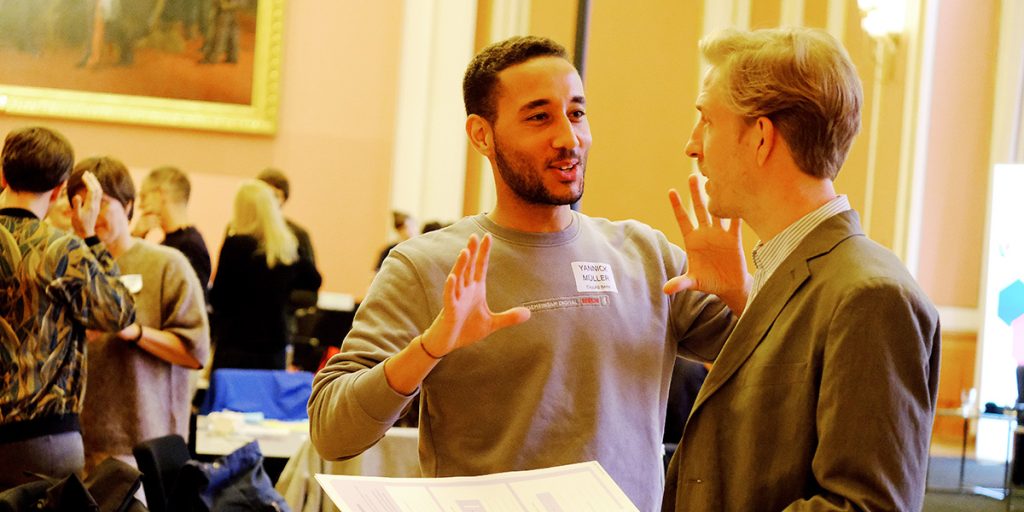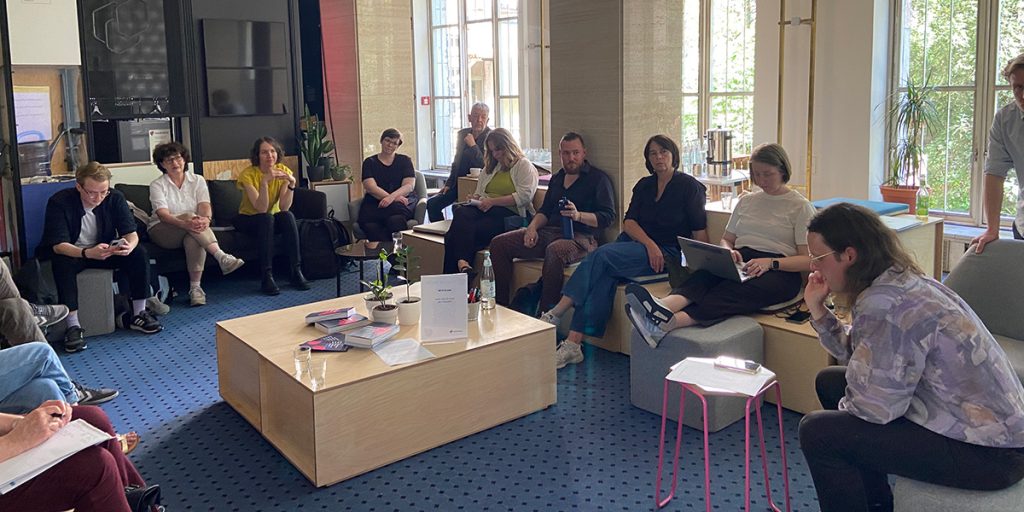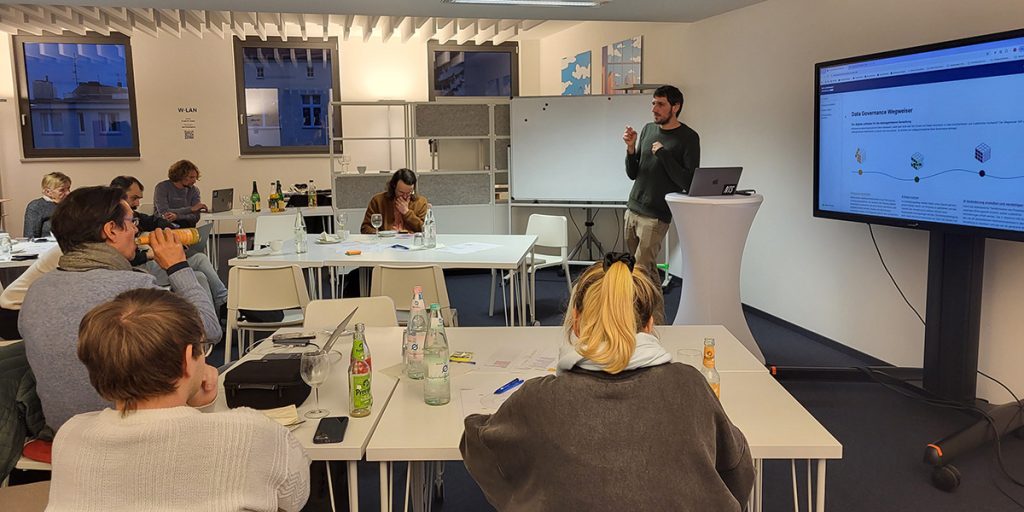How time flies! It feels like we were just sitting at our first community meeting of the year last winter at Platz der Luftbrücke, and now the scent of speculoos is back in the air. As the year winds down, we want to take a moment to reflect and use the quieter days to look back at the year in the context of the Smart City – with a focus on three key themes:
- Learning and Impact in the GD:B Community – Key areas and insights from the year.
- Action Implementation at CityLAB – An interview with Smart City expert Anja Lüttmann.
- Highlights from Strategy Implementation – Successful projects and a look ahead to 2024.
Seeing Impact, Measuring Impact, Acting on Impact
Gemeinsam Digital: Berlin is not just another strategy. It is designed as a living document aimed at fostering continuous learning within the Smart City ecosystem. This is evident, for example, in the proposed implementation model for initiatives: agile working methods, rapid prototyping, and a user-centered approach – all geared toward need-based results and quick learning effects.
Additionally, other factors play a significant role, such as close support of initiatives by the GD:B team (e.g., through service design and prototyping), as well as networking and collaboration among the initiatives to share learnings and create synergies. A core theme of this year’s discussions was impact orientation in the Smart City. For whom are we measuring impact? How do we assess it? What is the right framework for impact orientation? And how many resources does it require?
Even though all teams are impact-driven, the discussions on this topic were crucial for addressing doubts, methodological questions, and uncertainties together. Consistent impact orientation challenges unquestioned assumptions through reflection and, when applied methodically, regularly, and systematically, can significantly strengthen projects.

This year’s GD:B Annual Conference also focused heavily on impact. In addition to interactive exchange formats, Prof. Dr. Sascha Friesike highlighted the importance of a culture of learning from mistakes: without acknowledging errors, we fail to understand what didn’t work and have difficulty making the necessary adjustments.
A Guide to Sustainable Impact Orientation
Over the course of the year, the GD:B team developed a guide to impact orientation that seeks to incorporate all significant current trends and developments in this field while offering further reading on related topics. Using this guide, project teams can work through theories of change (IOOI chains) that outline their mechanisms of action, moving towards the formulation of goals and their monitoring.
In addition to the impact monitoring submitted by MPSC-funded projects to the coordination and transfer office of the funding line, the impact measurement of initiatives is also intended to be made transparent to the Smart City community. Through a digital template provided by the GD:B team, initiatives will be able to publish their goals and results.
Impact orientation, especially with a view to the long-term sustainability of initiatives for enduring impact, will continue to be a focus in the coming years.

Demand-Driven Support for Initiative Teams
The close support of measures by the GD:B team is, alongside the participatory approach, one of the core elements that distinguishes Gemeinsam Digital: Berlin from other strategies. Implementation teams are not sent into the process alone but receive tailored support offers, methods, guidelines, and workshops for innovation guidance, depending on the phase they are in. Smart City designer Anja Lüttmann reports throughout the year:
What does “measurements support” mean?
The GD:B strategy provides clear direction for digital projects in Berlin through the values compass and implementation model. This includes, among other things, working in an agile and common-good-oriented way. We help the teams integrate this approach with individual project planning and make adjustments when necessary. Workshops, guided by our methodology, focus on topics like goals and impact measurement, user-centered design, or learning experiences with project teams.
What were your highlights in the support of measures this year?
At the start of the support in 2022, we aimed to iteratively develop and expand the methodological support based on the needs of the measures. After two years of intensive user tests, we succeeded in creating a comprehensive support offer. Currently, we are considering how to make these formats and methods usable outside of the GD:B context.
Are there any ideas for next year?
The support for Smart City measures will, of course, continue. Some measures have tested their prototypes and are incorporating feedback into their solutions. The next step is to consolidate project results and present them in a way that ensures their sustainability. Knowledge transfer will continue to play an important role.
The year 2024 with a focus on the measures
Support for measures is not an end in itself – in the final section, we want to share a few highlights from the measures themselves: both pilot measures funded by the federal program and measures from the broader GD:B context.
The Kiezlabor, the Berlin Tiny House for digital transformation, essentially a small CityLAB, has just completed an intensive second season with seven locations and over 100 events. The Kiezbox for emergency communication in crisis situations has a functional prototype, can showcase an initial coordinated location in Berlin, and made significant progress toward the Proof of Concept. The pilot measure Smarte Partizipation successfully navigated the challenges of the tender process for an open-source application development. Similarly, the year was successful for the pilot measure Smart Water: Various products related to blue-green infrastructure are in different stages of development and testing: a BGI planner for administration, a flood information portal, and an educational game for the public.

Three measures we would like to take a closer look at for 2024:
SMART SPACE Hardenbergplatz – More Quality of Stay for the Common Good
Anyone who has been to Hardenbergplatz in Berlin knows how challenging it is for a project aimed at improving the quality of stay in that area. Anyone who knows the project team knows – if anyone can do it, it’s them!
During the summer months of 2024, the SMART SPACE project conducted a pre-test on Hardenbergplatz. One outcome of the project will be that citizens can apply for a special usage permit for public space through a digital negotiation platform. A lively, multifaceted use of public space is intended to enhance the quality of stay. On designated areas of the square, associations, initiatives, and similar groups can register for a community-oriented use: from consultation hours and informational formats to flea markets and concerts, everything is possible. The summer of 2024 offered a preview of what to expect: from the demonstration of the Grunewald sawmill to recruit apprentices, to the sounds of “Soul im Kiez,” and even the co-creation of a more beautiful Hardenbergplatz with students.
For the project team, the pre-test was extremely important and educational. The next step for the following year is to integrate the test results into the work and ensure the sustainability of the prototype.
Data & Smart City Governance – An Interactive Guide for Smart City Measures
Data Governance is one of the key cross-cutting themes in Smart City projects. The Data & Smart City Governancemeasure develops an interactive guide for Smart City initiatives that involve data. It equips projects with materials for further reading, methods, templates, formats, and best practice examples, thereby supporting the process of asking and systematically solving the key questions. The goal is to enable projects to succeed while considering their legal, organizational, and technical requirements, and avoid unnecessary restrictions, such as concerns over data privacy risks.
This year, the project team continuously tested the guide in various formats to ensure it meets the needs of the target groups – through workshops at the MPSC Congress in Cologne or through user tests with selected administrative staff across Germany. The numerous learnings are being integrated into the ongoing development of the guide, ensuring maximum user orientation.
Digital-Zebra and the Smart City for Seniors: Digital Participation for All
A target group that is often overlooked in smart city projects is seniors – but Berlin is once again leading the way: whether through low-threshold support via phone with the information hotline from Silbernetz, the digital map for finding specific offers for older people from the Seniorennetz, or the Digital-Zebra of the Berlin libraries – in-person consultations with Digital Navigators on various topics of digital participation.
The Digital-Zebra is not only relevant for seniors but also for other groups with limited access to digital media or those lacking knowledge about digital services. The Digital-Zebra is now present in all Berlin districts, with a total of 22 participating libraries. The service is already operational at 12 locations and is continuously evaluated and user-orientedly developed further. Through shadowing and 60 training sessions on various topics, from accessibility to cybercrime, the Digital Navigators were prepared for their work. With contributions from RBB, ARD, and ZDF, the important topic of digital participation is also receiving the attention it deserves through the work of the Digital-Zebra.
As you can see, the strategy implementation is in full swing. We are learning with and from it and look forward to regularly reporting on it.
